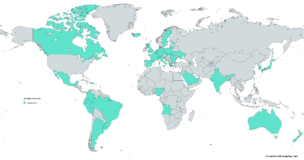The World Economic Forum and ESA joined forces to draft a new set of orbital debris mitigation recommendations, which were released Tuesday. The four-page guideline already has support from more than two dozen industry players, including Airbus, Planet, Astroscale, and SES.
“Space is critical for our modern way of life,” the document says. “We therefore need to protect this domain for the benefit of all humankind.”
The bottom line: The document sets four “ambitious yet sensible” targets for industry that will boost sustainability in orbit.
- Operators should deorbit satellites within five years of their end date starting with missions that begin in 2023.
- Satellites should be able to maneuver in orbit, preferably by having propulsion systems onboard.
- Companies should share STM data openly and quickly with other operators to avoid collisions.
- Liability insurance providers should offer incentives for sustainable missions, using metrics like Space Sustainability Rating.
Further out: The document also makes some longer-term recommendations to be tackled at a higher-level than individual companies. The document urges officials to study the environmental capacity of space, or the number of active and defunct missions that can co-exist in orbit while maintaining a stable environment.
It calls for governments to try “leading by example,” including by setting a five-year deorbit requirement for equipment in orbit, investing in capabilities such as active debris removal and space situational awareness, and incentivizing data sharing and coordination.
The document also hints at the “new business opportunities” and “entire markets” that could spring up when companies implement more sustainable practices, including wrestling unresponsive satellites out of orbit.
The signatories: The guidelines have support from 27 companies already, including some that are planning major constellations, such as OneWeb, and others more focused on moving assets around in space, such as Astroscale and D-Orbit.
But some major space players planning huge constellations, including SpaceX’s Starlink, are absent from the agreement.
Why the WEF: The organization, which is best known for its annual gathering in Davos, Switzerland, may not seem like the obvious choice to tackle the problem of space debris, but the forum has been delving into space more over the past few years toward its broader goal of “improving the state of the world.”
The forum released a two-page concept paper in April 2022 calling for the creation of a Space Sustainability Monitor to track how nations implement sustainability best practices and voluntary guidelines. The forum also led the charge to develop a “space sustainability rating” system to certify which missions are operating sustainably, the same way a building might boast a LEED certification to showcase environmental efforts.




